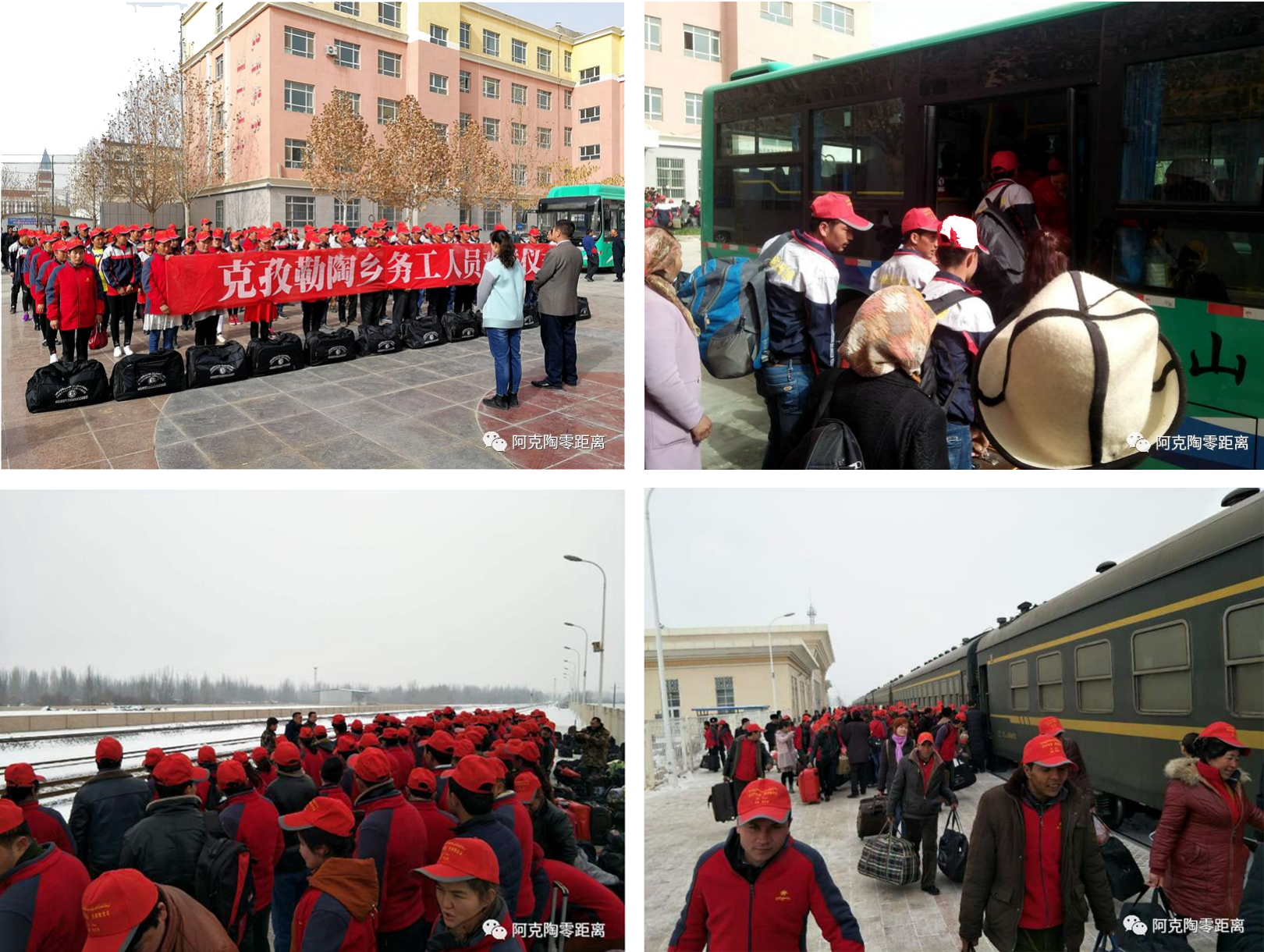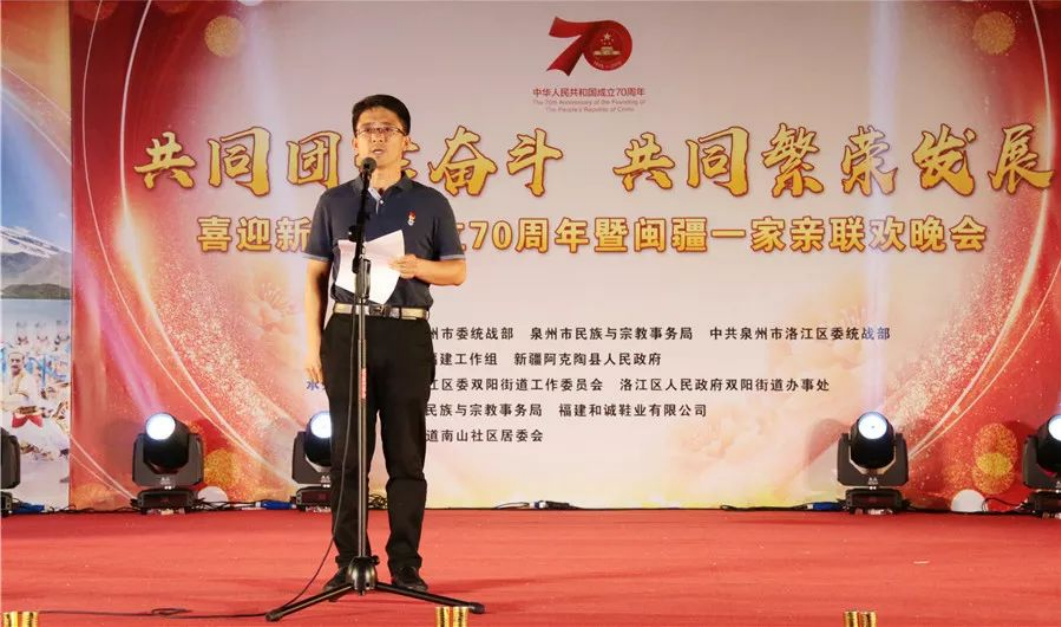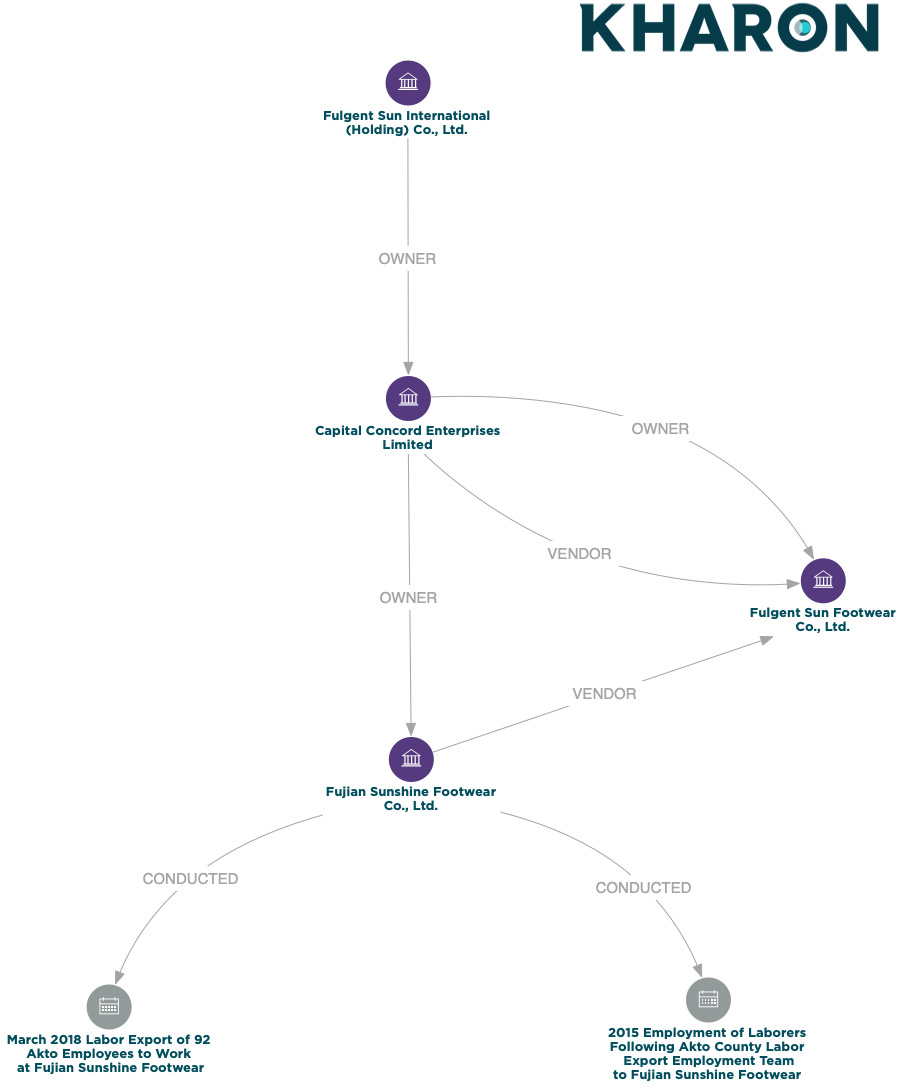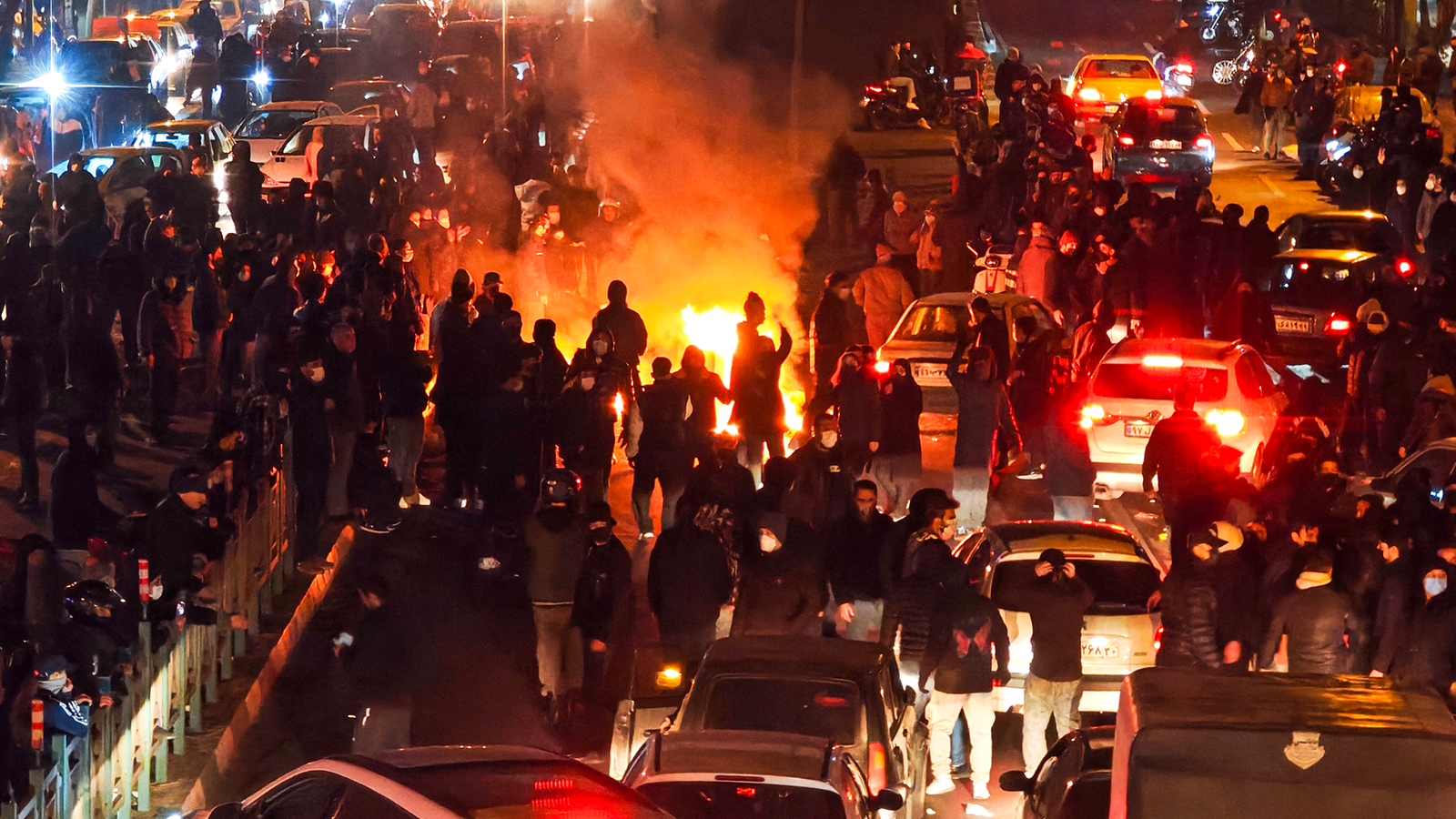A Taiwanese shoemaker that is an original equipment manufacturer (OEM) for international footwear brands has a wholly-owned subsidiary in China that exhibited indicators of forced labor prior to passage of the Uyghur Forced Labor Prevention Act (UFLPA), highlighting the challenges apparel and footwear companies face in ensuring compliance with forced labor regulations.
China plays a critical role in the manufacturing of footwear and sourcing of key components used by the footwear industry, to include natural fibers like cottons, leather, synthetics, recycled polyester, rubber, and wool. Other top global shoemakers, such as Vietnam, are heavily dependent on China’s raw materials for their products.
UPDATE:
Following publication of this article in August 2023, Fulgent Sun International, which is named in the report, informed Kharon that company representatives engaged with the U.S. government to demonstrate its compliance with UFLPA requirements. Fulgent Sun shared relevant information with Kharon as well.
This article has been updated to include a statement from Fulgent Sun, and to re-emphasize that any public information regarding Fulgent Sun as relevant to red flag indicators was dated prior to the passage of the UFLPA. Kharon has observed no information relevant to red flag indicators since the UFLPA went into effect.
Fulgent Sun’s statement to Kharon reads in part: “This update and the actions of Fulgent are a positive development and a ‘good news’ story in the context of forced labor enforcement. The 2022 UFLPA regulations and data analysis publications like the August 2023 Kharon article, are responsible for raising awareness and driving change in global supply chains. The global supply chain benefits from the evolution in commercial policy and operations that some international manufacturers have embraced because of these new laws and Kharon’s reporting. The Fulgent Sun narrative and its engagement on forced labor compliance are the behaviors one should expect to see from responsible actors in the global supply chain.”
(See full statement at end of article)
Labor Transfers Prior to Passage of UFLPA
The transfer or use of laborers through Chinese government-sponsored programs from Xinjiang under the guise of “poverty alleviation” may be an indicator of forced labor, the U.S. government has warned.In March 2018, prior to the passage of the UFLPA, Fujian Sunshine Footwear received a transfer of 62 “registered impoverished people” from Akto County in the Xinjiang Uygur Autonomous Region, according to Chinese reporting at the time. The transfer was organized by Akto County’s Human Resources and Social Security Bureau, according to an Akto County report. Fujian Sunshine Footwear is a Chinese company wholly owned by Fulgent Sun International – a publicly traded manufacturer in Taiwan. Fujian Sunshine Footwear is located in Quanzhou, China, which sits immediately across the Strait from Taiwan.
A second Chinese media report from February 2018 – one month earlier – provides additional detail on the transfer of Xinjiang labor by Akto Human Resources and Social Security Bureau to Fujian. The report states:
“the county's human resources and social security department, after extensive investigations, dispatched specialized personnel to connect migrant workers with enterprises,” naming Fujian Hecheng Shoes [Fujian Sunshine] among the destination companies.

Images from both the March and February 2018 articles show Xinjiang-origin workers in matching uniforms and attire boarding government-organized buses and trains en route to their employment sites.
(Top Row)
March 2018 report on labor transfer organized by the Akto Human Resources and Social Security Bureau.
(Bottom Row)
February 2018 labor transfer organized by the Akto Human Resources and Social Security Bureau.
A November 2021 Chinese media interview with a government official of Kizilsu Kyrgyz Autonomous Prefecture in Xinjiang discussed the government’s poverty alleviation through employment efforts, including providing subsidies for “vocational skills training”, and mentioned a farmer from Kizilto Town, Akto County, who started working at Fujian Sunshine Footwear Co., Ltd. through a “labor transfer.” The U.S. government’s 2021 Xinjiang Business Advisory identifies nonstandard hiring practices, hiring through government recruiters, and terminology related to poverty alleviation and reskilling as possible indicators of forced labor.
In August 2019, Fujian Sunshine co-hosted a gala titled “Joint Unity and Strive for Common Prosperity and Development,” commemorating the 70th anniversary of the founding of the People’s Republic of China. The event was jointly sponsored by Party and state bodies from Xinjiang and Fujian, including the United Front Work Department and the Xinjiang Working Group in Fujian. Attendees included Fulgent company representatives, local officials, and Xinjiang-origin employees of Fujian Hecheng Shoes, who also wrote, directed, and performed the event’s program.

Fulgent Sun International, the parent organization of these two companies, is also listed as an OEM for a number of international brands in the U.S., France, U.K., South Korea, and elsewhere. Several of these brands were recipients of shipments from Fujian Sunshine Footwear and Fulgent Sun Footwear in 2023.
Despite the focus on Xinjiang as a source of forced labor risk, the CBP detentions to date have targeted a substantial number of imports from intermediary countries like Vietnam; nearly half of detained shipments in the apparel, footwear, and textiles industry have been from non-China sources.

Sourcing Raw Components
The Uyghur Forced Labor Prevention Act (UFLPA) prohibits the importation of goods into the United States mined, produced, or manufactured wholly or in part with forced labor in China. Cotton and its downstream products from Xinjiang were also added to the U.S. Customs and Border Protection (CBP) Withhold Release Order list in January 2021, banning their import into the United States.The U.S. government in its 2021 Xinjiang Supply Chain Business Advisory also highlighted raw materials used in the production of footwear, such as cotton, as high risk for exposure to forced labor in Xinjiang. Kharon has previously reported on companies involved in the production and sourcing of raw components from Xinjiang used in global apparel and footwear production.
Fulgent Sun provided the following statement to Kharon:
“Kharon’s August 2023 article references a November 2021 Chinese media publication claiming that Fujian Sunshine Footwear, a China-based affiliate of Taiwan headquartered Fulgent Sun International, may have hired individuals from Xinjiang Province, China through a labor transfer in March 2018. These alleged hiring practices took place more than four years before the Uyghur Forced Labor Prevention Act (UFLPA) was implemented. The U.S. Government only released its first publication warning businesses about the risks of engaging with entities linked to forced labor and human rights abuses in Xinjiang Province in July 2020. The chronology of these events makes it clear that the hiring practices described in the August 2023 Kharon article took place well before the U.S. Government prohibited – or even published warnings about – imported goods made in connection with Xinjiang Province.
Fulgent Sun has not participated in any government recruitment programs in China and, consistent with its risk-based due diligence practices, ceased any independent recruitment or hiring of employees from Xinjiang in 2021, in accordance with U.S. government guidance on the risks associated with operating in the region. The company provided the U.S. Government evidence that the last employee from Xinjiang voluntarily departed Fulgent in December 2021 and returned home or sought employment elsewhere. Fulgent Sun further emphasizes its comprehensive corporate response to the 2022 UFLPA regulations, enacting polices to assure ongoing compliance with anti-forced labor policies across its supply chain. Fulgent Sun also provided Kharon with copies of the submissions it had made to the Forced Labor Enforcement Task Force (FLETF) in December 2023, following the publication of Kharon’s August 2023 article. Those submissions detailed Fulgent’s workplace policies and practices designed to guard against forced labor in its own factories, as well as in its supply chain, multiple Social Compliance Audits, workplace audits and Current State Assessment of the company’s operations, and a detailed analysis of the International Labour Organization “Indicators of Forced Labor” as it relates to Fulgent’s operations.
This update and the actions of Fulgent are a positive development and a “good news” story in the context of forced labor enforcement. The 2022 UFLPA regulations and data analysis publications like the August 2023 Kharon article, are responsible for raising awareness and driving change in global supply chains. The global supply chain benefits from the evolution in commercial policy and operations that some international manufacturers have embraced because of these new laws and Kharon’s reporting. The Fulgent Sun narrative and its engagement on forced labor compliance are the behaviors one should expect to see from responsible actors in the global supply chain.”
- Eric Choy, Executive Director for Trade Remedy and Law Enforcement, U.S. CBP
ED Choy's full remarks can be viewed here:
A Fireside Chat with CBP: UFLPA Enforcement, Year One and Beyond







